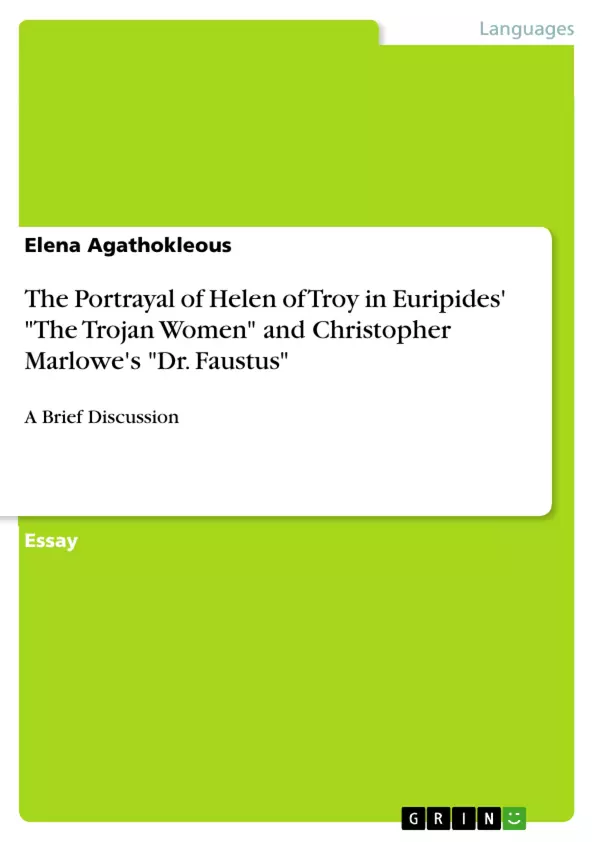This essay discusses the portrayal of Helen of Troy in Euripides‘ "Trojan Women" and her apparition in Marlowe’s "Dr. Faustus".
One of the most recurring figures in literature, Helen of Troy appears in numerous works, whether related to the Trojan War or not. From Homer to more recent times Helen has appeared and has been portrayed by many writers, poets or playwrights each time assuming the role assigned to her in the text.
In Euripides’ "Trojan Women", Helen appears as the cause of Troy’s devastation and she is given the opportunity to defend herself through the innovation of her physical presence on stage. On the other hand in Marlowe’s "Dr. Faustus" which is more oriented towards religion, she is there as a devil in disguise acquiring a symbolic significance of sensual pleasure as the ultimate temptation.
Table of Contents
- Introduction
- The Trojan Women
- Helen's Defense
- The Chorus and Hecuba's Response
- The Audience's Perspective
- Dr Faustus
- Helen's Appearance
- Faustus's Desire for Knowledge and Sensuality
- The Importance of Helen's Temptation
- Conclusion
Objectives and Key Themes
This paper explores the portrayal of Helen of Troy in two distinct literary works: Euripides' *The Trojan Women* and Marlowe's *Dr Faustus*. The analysis investigates the motivations, symbolism, and impact of Helen's character on the narrative of each play, showcasing the evolving portrayal of this mythological figure throughout history.
- The enduring power of Helen's beauty and its influence on men
- The contrasting interpretations of Helen's culpability in the Trojan War
- The use of Helen as a symbol of temptation and sensual pleasure
- The interplay between divine intervention and human agency in shaping Helen's fate
- The impact of Helen's portrayal on the audience's perception of the characters and themes of the play
Chapter Summaries
The first chapter examines Helen's portrayal in *The Trojan Women*, focusing on her defense of her actions in the Trojan War. The analysis investigates how her physical presence on stage and her attempt to shift blame to others affects the audience's sympathy and understanding of her character.
The second chapter delves into Helen's appearance in *Dr Faustus*, exploring her symbolism as a temptation for Faustus and her role in his downfall. The chapter investigates how her beauty serves as a catalyst for Faustus's surrender to sensual desire and ultimately his damnation.
Keywords
The paper focuses on the portrayal of Helen of Troy, her beauty, her culpability in the Trojan War, temptation, sensual pleasure, divine intervention, human agency, audience perspective, *The Trojan Women*, *Dr Faustus*, Euripides, Marlowe.
Frequently Asked Questions
How is Helen of Troy portrayed in Euripides' "The Trojan Women"?
In Euripides' play, Helen is portrayed as the cause of Troy’s devastation, but she is given a physical presence on stage to defend her actions.
What is Helen's role in Christopher Marlowe's "Dr. Faustus"?
In "Dr. Faustus," Helen appears as a devil in disguise, symbolizing sensual pleasure and acting as the ultimate temptation for Faustus.
What are the key themes of this literary analysis?
Key themes include the power of beauty, interpretations of culpability in war, the use of Helen as a symbol of temptation, and the interplay between divine intervention and human agency.
How does Helen's presence on stage affect the audience in "The Trojan Women"?
Her physical presence and attempt to shift blame affect the audience's sympathy and understanding of her character's motivations.
Why is Helen's appearance significant for Faustus's downfall?
Her beauty serves as a catalyst for Faustus to surrender to sensual desire, leading ultimately to his damnation and spiritual fall.
Which authors' works are compared in this study?
The study compares the works of the Greek playwright Euripides and the Elizabethan playwright Christopher Marlowe.
- Quote paper
- Elena Agathokleous (Author), 2021, The Portrayal of Helen of Troy in Euripides' "The Trojan Women" and Christopher Marlowe's "Dr. Faustus", Munich, GRIN Verlag, https://www.grin.com/document/995894



